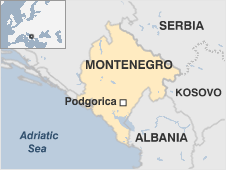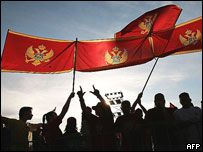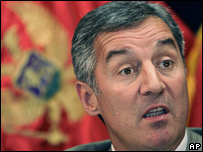 |
Montenegro emerged as a sovereign state after just over 55% of the population opted for independence in a May 2006 referendum.
The vote heralded the end of the former Union of Serbia and Montenegro - itself created only three years earlier out of the remnant of the former Yugoslavia.
Overview
The EU-brokered deal forming it was intended to stabilise the region by settling Montenegrin demands for independence from Serbia and preventing further changes to Balkan borders.
The same deal also contained the seeds of the union's dissolution. It stipulated that after three years the two republics could hold referendums on whether to keep or scrap it. Montenegro opted for the latter.

A narrow majority voted to dissolve the union with Serbia
|
Montenegro last experienced independence nearly 90 years earlier. It was absorbed into the newly-formed Yugoslavia at the end of World War I.
There were fears that the 2006 independence vote could lead to unrest in the areas of Montenegro where ethnic Serbs who make up roughly a third of the population formed the majority and strongly opposed separation from Serbia. There was backing for independence from most ethnic Montenegrins and ethnic Albanians living in Montenegro.
The pro-independence camp led by Prime Minister Djukanovic argued that the association with Serbia was holding the republic back not least with its bid for EU membership.
As the successor state to the union Serbia inherited its seat at the UN and other international organisations. The newly-independent Montenegro has since been
admitted to the UN in its own right.
The country officially applied to join the EU on 15 December 2008.
Montenegro which means "Black Mountain" borders Croatia Bosnia Serbia Serbia's breakaway province of Kosovo and Albania. About half of it is covered in thick forest. The tiny republic encompasses an Adriatic coastline lowlands and high mountain ranges. The Tara River canyon is the deepest and longest in Europe.
Facts
- Full name: Republic of Montenegro
- Population: 624000 (UN 2009)
- Administrative capital: Podgorica
- Area: 13812 sq km (5333 sq miles)
- Main religions: Christianity Islam
- Languages: Serbian Montenegrin
- Life expectancy: 72 years (men) 76 years (women) (UN)
- Monetary unit: euro
- Main export: Aluminium
- GNI per capita: $6440 (World Bank 2008)
- Internet domain:.me and .cg.yu
- International dialling code: (+382)
Leaders
President: Filip Vujanovic
Filip Vujanovic a pro-independence candidate and an ally of the prime minister has been president since May 2003. He was re-elected in April 2008.
Prime minister: Milo Djukanovic
Milo Djukanovic returned to politics from retirement to become Montenegro's prime minister for a fifth time in February 2008 replacing ally Zeljko Sturanovic who resigned on health grounds.

Prime Minister Milo Djukanovic
|
He was re-elected by a landslide in parliamentary elections in March 2009 when his pro-EU European Montenegro Coalition 48 out of 81 seats allowing it to form a government on its own. The pro-Serbia Socialist People's Party won 16 seats.
Mr Djukanovic said the win gave him the mandate to push through the potentially painful economic and social reforms needed to gain rapid EU accession. He also announced plans to push for membership in Nato even though the alliance has been unpopular in the region since its bombing of Serbia over Kosovo in 1999.
Previously the 45-year-old Mr Djukanovic was in power without a break - as prime minister or president of Montenegro - between 1991 and 2006 and he spearheaded Montenegro's successful campaign for independence.
His retirement from active politics in October 2006 came as a surprise. When a majority of Montenegro's 650000 people voted in a referendum that May to end their union with Serbia their choice was seen as Mr Djukanovic's personal achievement.
Mr Djukanovic's coalition won a majority in an election three months later. He turned down the post of prime minister in favour of Mr Sturanovic but remained at the helm of his Democratic Party of Socialists saying he wanted to focus on business.
Media
Press freedom is guaranteed and media laws passed in 2002 provide for the transformation of state-funded RTCG into a public broadcaster. But some media watchdogs have pointed to ongoing political influence over editorial policies.
In 2004 the killing of Dusko Jovanovic the editor of the opposition daily Dan sparked an outcry. Demonstrators accused the authorities of complicity.
Overseas donors and organisations have encouraged the growth of independent media outlets. But commercial operators compete for a small pool of advertising revenue. The market - with dozens of private radio and TV stations - is said to be saturated.
The Montenegrin media enjoyed greater freedom than their Serbian counterparts in the last years of Milosevic rule. Many private outlets managed to break the former state monopoly.
The press
Television
- TV Montenegro - state-funded operates two networks and a satellite channel
- TV IN - private
- ntv Montena - private
- TV Elmag - private
- Pink M - Montenegrin offshoot of Belgrade-based network
Radio
- Radio Montenegro - state-funded operates two networks
- Radio Elmag - private
- Antena M - private
- Radio D - private
News agency
-
MNNews-Mina - private
AFRICA | ASIA-PACIFIC | AMERICAS | EUROPE | MIDDLEEAST | SOUTHASIA
Mauritania Mauritius Morocco Mozambique Namibia Niger Nigeria Republic-of-congo Rwanda Sao-tome-and-principe Senegal Seychelles Sierra-leone Somalia South-africa Sudan Swaziland Tanzania The-gambia Togo Tunisia Uganda zambia Zimbabwe Australia Brunei Burma Cambodia China East-timor Fiji Indonesia Japan Kazakhstan Kiribati Kyrgyzstan Laos Malaysia Marshall-islands Micronesia Mongolia Nauru New-zealand North-korea Palau Papua-new-guinea Samoa Singapore Solomon-islands South-korea Taiwan Tajikistan Thailand The-philippines Tonga Turkmenistan Tuvalu Uzbekistan Vanuatu Vietnam Antigua-and-barbuda Argentina Bahamas Barbados Belize Bolivia Brazil Canada Chile Colombia Costa-rica Cuba Dominica Dominican-republic Ecuador El-salvador Grenada Guatemala GuyanaHaiti Honduras Jamaica Mexico Nicaragua Panama Paraguay Peru St-kitts-and-nevis St-lucia St-vincent-and-the-grenadines Suriname Trinidad-and-tobago United-states-of-america Uruguay Venezuela Albania Andorra Armenia Austria Azerbaijan Belarus Belgium Bosnia-hercegovina Bulgaria Croatia Cyprus Czech-republic Denmark Estonia Finland France Georgia Germany Greece Hungary Iceland Ireland Italy Latvia Liechtenstein Lithuania Luxembourg Macedonia Malta Moldova Monaco Montenegro Norway Poland Portugal Russia San-marino Serbia Slovakia Slovenia Spain Sweden Switzerland The-netherlands Turkey Ukraine United-kingdom Vatican Algeria Egypt Iran Iraq Israel-and-palestinian-territories Jordan Kuwait Lebanon Libya Mauritania Oman Saudi-arabia Sudan Syria Tunisia United-arab-emirates Yemen Afghanistan Bangladesh Bhutan India Nepal Pakistan Sri-Lanka The-Maldives

